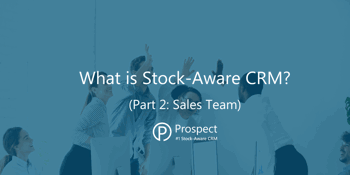
What is Stock-Aware CRM? (Part 2: Sales Teams)
.png?rmode=max&width=156&height=73) Hopefully, you’ve managed to have a quick read of Part 1 first...if not, here it is!
Hopefully, you’ve managed to have a quick read of Part 1 first...if not, here it is!
So now that we’ve established the type of business you operate, let us briefly tell you why your Sales teams need a different type of CRM to meet their unique requirements.
Let’s take a couple of the key roles or hats in a Sales team and contrast the "traditional CRM needs" in a non-B2B business with a wholesale, distribution or manufacturing business like yours. These tables take 3 key roles (or hats):
- Sales Manager
- New Business Sales (getting new sales accounts)
- Account Manager (or area sales, or whatever you call this role, but essentially farming the base you have)
In Products-R-Us we have a Sales Manager. We also have someone who targets new business development and then someone who manages 30 existing key accounts. Contrasting with them, we have a business that doesn’t sell physical products with the same 3 roles.
| SALES MANAGER | Products-R-Us (your business!) | Do not sell products from stock |
|---|---|---|
| Record usual CRM interactions e.g. calls, emails, documents etc. | ||
| See which customers spend is increasing and know if the Account Management team aware of this (and are subsequently maximising that increase in business). | ||
| Get the full picture of exactly what’s happening with customers in a consolidated view. | ||
| See which customers are spending less or have stopped buying/using your business and know if Account Managers know why to see if the situation can be rectified. | ||
| Know if stock they hold is in danger of becoming obsolete/which items they’re in danger of being overstocked on to ensure they apply special pricing and promotions to keep the stock moving. | ||
| Have access to accurate stock forecasting for various warehouses which hold stock. | ||
| Easily and quickly identify which products are selling well, which aren’t, analysing geographically and looking for seasonality to ensure Sales teams are aware of these metrics and maximise opportunities as a result. | ||
| Be able to restrict certain products by customer e.g. qualified to sell, authorised to sell or bespoke branded products to retain central control of products and sales. | ||
| Have the opportunity to sell from a larger catalogue of products (perhaps from suppliers) than own stock file with no disruption and ease of process for the Sales teams. | ||
| Make sure that delivery charges are calculated automatically based on order content and customer details to turn delivery charges from loss making into profit making and to avoid human-error in the sales process. | ||
| Hold regular review meetings for each potential project and discuss with Sales teams what the decision-making process is and who the decision-making group is to plot next advances in the sale. | ||
| Be aware of critical time points in each long sales cycle to ensure tenders are submitted on time with correct supporting documentation, for example. | ||
| Take a view on pricing and negotiation for each project and determine specific terms & conditions. | ||
| Analyse customer purchasing terms for red flags i.e. penalty clauses. |
| NEW BUSINESS SALES | Products-R-Us (your business!) | Do not sell products from stock |
|---|---|---|
| Record usual CRM interactions e.g. calls, emails, documents etc. | ||
| Keep track of all Sales opportunities using pipelines and easily progress opportunity/lead through pipeline to update its status. | ||
| Build and send accurate product quotes quickly, without manually checking any prices. | ||
| Ability to create multiple versions of quotes. | ||
| Quickly and easily take orders (in office/out in the field) and push through to back-office system without need for any re-keying. | ||
| Know what stock is available today, next week/month etc. to sell the right things at the right time to the right customers. | ||
| Be able to increase average order values with CRM’s upsell, cross-sell & must-sell capabilities. | ||
| Sell products the way their customers want to buy them e.g. multiple pack sizes (single, small box, large box or pallet). | ||
| The opportunity to quote during a sale is quite often governed through a tender process. | ||
| Be able to create quotes outside of CRM e.g. in Word, as each quote is different and needs to describe the specific type of service they’ll deliver. | ||
| Quotes are more of a descriptive document (i.e. little or no tables). | ||
| Typically require an Excel tool to know how much to charge depending on what resources are required for the project in hand. | ||
| Have consultations with clients, consultants and professional bodies, and receive briefs from clients about their specific requirements. | ||
| Non-product sales often experience a much longer sales cycle, anything from 6-36 months. | ||
| Have access to project management and design tools to build a scope of the project. |
| ACCOUNT MANAGERS | Products-R-Us (your business!) | Do not sell products from stock |
|---|---|---|
| Record usual CRM interactions e.g. calls, emails, documents etc. | ||
| Keep track of all Sales opportunities using pipelines and easily progress opportunity/lead through pipeline to update its status. | ||
| Know which customer’s spend is increasing and maximise this increase in business. | ||
| Know which customers are spending less or have stopped buying completely so they can rectify the situation if possible. | ||
| Set reminders for e.g. 6 months’ time to see if there are opportunities to secure repeat business | ||
| See customer’s sales history & back orders. | ||
| Sell products the way their customers want to buy them e.g. multiple pack sizes (single, small box, large box or pallet). | ||
| Have access to customer sales transaction history to easily increase recurring business levels. | ||
| Be able to increase average order values with CRM’s upsell, cross-sell & must-sell capabilities. | ||
| Visit key customers on-site regularly/periodically. | ||
| Quote may not match ultimate invoice. | ||
| Be able to create quotes outside of CRM e.g. in Word, as each quote is different and needs to describe the specific type of service they’ll deliver. | ||
| Ensure customers sign up for a recurring revenue contract for ongoing work. | ||
| Typically require an Excel tool to know how much to charge depending on what resources are required for the project in hand. | ||
| Have access to project management and design tools to build a scope of the project. |
As you can see, the table above shows that although both businesses have the same need for "traditional CRM", the Sales team at Products-R-Us have a whole host of additional data and process needs in order for them to do their job properly that only Stock-Aware CRM can deliver on.
Interested in having a demo of Prospect, the Stock-Aware CRM? Book in a call with our team today. Alternatively, why not watch our Webinar about Stock-Aware CRM here.
